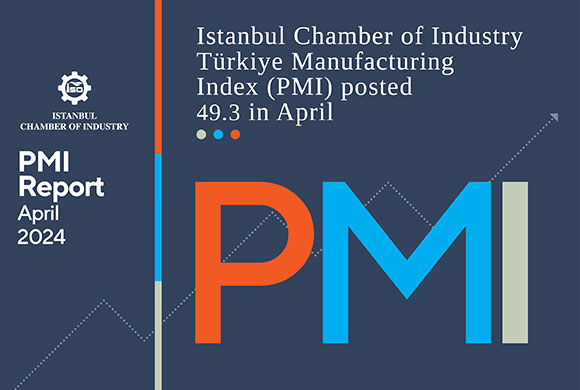News
ICI Released April 2024 Türkiye Manufacturing PMI and Türkiye Sector PMI Report
- 02.05.2024
- News

The headline PMI moved below the 50.0 no-change mark in April, posting 49.3 from 50.0 in March. The index thereby signalled a moderation of business conditions for the first time in three months. The renewed moderation of business conditions in part reflected a return to slowing output in April. Demand was impacted by rising prices and high interest rates, with new orders softening for the tenth month running.
According to the Istanbul Chamber of Industry Türkiye Sector PMI report, 2 out of 10 monitored sectors increased their output, which are food products and non-metalic mineral products sectors. Food products saw the highest increase in output for three months in a row. Machinery and metal products, on the other hand, had the most significant moderation in output. The number of sectors increasing their staffing levels increased to five in April from two in March.
The April 2024 period of Istanbul Chamber of Industry (ISO) Türkiye Manufacturing PMI (Purchasing Managers’ Index) survey, which is the fastest and most reliable reference accepted in manufacturing industry performance of the economic growth, was announced. According to the results of the survey where any figure greater than 50.0 indicates overall improvement of the sector, the headline PMI moved below the 50.0 no-change mark in April, posting 49.3 from 50.0 in March.
PRODUCTION EASES FOR THE FIRST TIME IN 3 MONTHS
The renewed moderation of business conditions in part reflected a return to slowing output in April. Production eased for the first time in three months amid softening demand conditions. Demand was impacted by rising prices and high interest rates, with new orders softening for the tenth month running. New business from abroad also moderated, again linked to price increases, but to a lesser extent than total new orders. Input costs continued to rise sharply amid currency weakness and higher prices for raw materials and logistics. The rate of inflation eased to a four-month low, however, which was also the case with regards to selling prices.
FIRMS CONTINUES TO EXPAND THEIR PURCHASING ACTIVITIES
In spite of the weakness in new orders and output, firms continued to expand their purchasing activity. Input buying rose for the third month running, feeding through to higher stocks of purchases for the first time in almost two years. Meanwhile, stocks of finished goods also accumulated, reflecting the recent spell of production growth at a time of moderating new orders. Employment was broadly unchanged following slowdowns in each of the previous two months. Some respondents mentioned the need for extra staff, but others reported that finding suitable workers had proved challenging.
Commenting on the Istanbul Chamber of Industry Turkey Manufacturing PMI survey data, Andrew Harker, Economics Director at S&P Global Market Intelligence, said: "The recent spell of output growth was unable to be sustained at a time of moderating new orders and came to an end in April. Firms will be hoping that demand can pick up soon and feed through
to sustainable improvements in production. There was some easing of inflation over the month to the lowest in the year so far, but manufacturers are still having to contend with rapid price increases which is hampering their ability to secure new business both at home and abroad.”
OUTPUT WEAKENS IN MOST OF THE SECTORS
The Türkiye Sector PMI Report pointed out that the recent trends in the manufacturing sector continued in April. Output and new orders weakened in the majority of the ten sectors monitored, while a relatively positive outlook emerged on the employment side, with half of the sectors increasing the number of their employees. Despite signs of improvement in supply chains, inflationary pressures remained strong.
Output expanded in two out of 10 monitored sectors, which are food products and non-metallic mineral products sectors. In addition to being the sector with the highest increase in output for the third month in a row, the food products sector recorded the strongest growth in the last 10 months. Machinery and metal products sector, where output contracted sharply in April following the moderate increase in March, showed the most significant moderation. Similarly, new orders increased in only two sectors. The clothing and leather products sector moved into the recovery zone again and accompanied the food products sector in the increase in demand. As in output, the most significant decrease in new orders was seen in machinery and metal products firms. Foreign demand conditions generally remained stagnant, and the only sectors that could provide an increase in new export orders in April were clothing and leather products sector.
STAFFING LEVELS INCREASED IN 5 SECTORS
There was a more positive outlook on the foreign demand side. The number of sectors increasing their staffing levels increased to five in April from two in March. Employment in non-metallic mineral products, land and sea vehicles, and wood and paper products is on the rise again. Among the ten sectors monitored, the strongest increase was recorded in wood and paper products sector.
Supply chain conditions also showed signs of improvement in April. Lead times have shortened in the majority of sectors, generally due to weakening demand for inputs. In the electrical and electronic products sector, which had the strongest improvement in supplier performance, lead times recorded the sharpest decline since January 2016. In contrast, delays increased significantly in the chemical, plastic and rubber products sector.
FOOD HAD THE SHARPEST INCREASE IN FINAL PRODUCT PRICES
The disruptions experienced in the supply chains of the chemical, plastic and rubber products sector in April caused the sharpest increase in input costs in this sector. On the other hand, the sharpest increase in final product prices was recorded in food products, due to the relatively high pricing power of the sector. The most limited increase in sales prices was in the machinery and metal products sector.
*You can find attached the Istanbul Chamber of Industry Türkiye Manufacturing PMI and Sector PMI April 2024 reports.